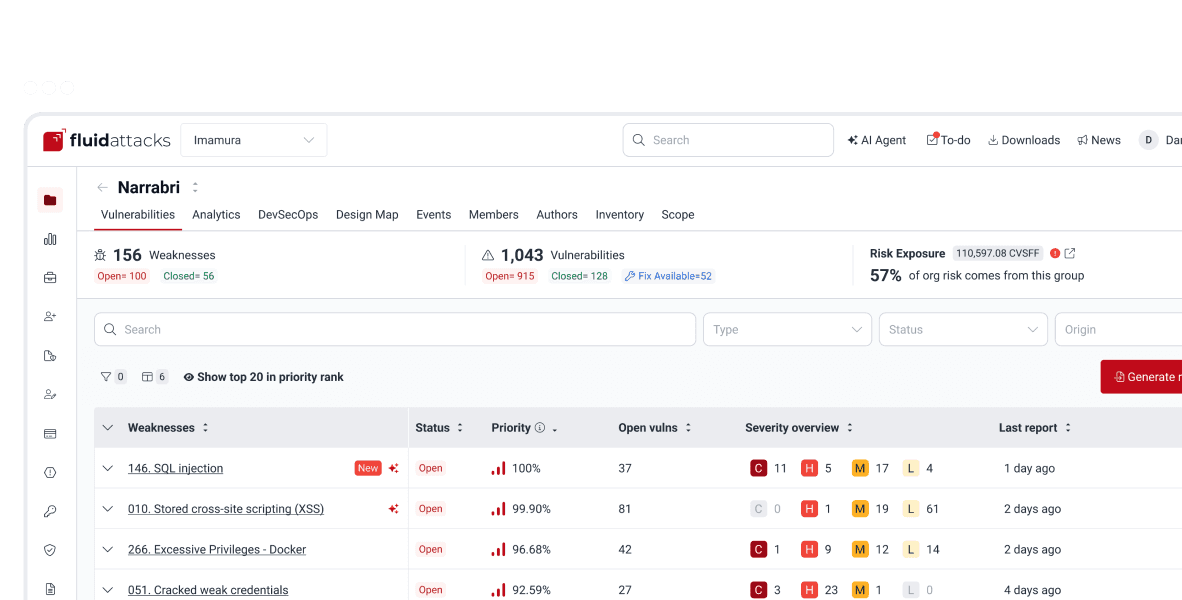Penetration testing as a service (PTaaS)
Get evidence of exploitable flaws in your software
Continuous in-depth assessments by our pentesters
Discovery of known and zero-day vulnerabilities in your software
Risk assessment closer to the real threat landscape

Companies already benefiting from Fluid Attacks' PTaaS
Why your company should choose Fluid Attacks' pentesting as a service (PTaaS)
Why your company should choose Fluid Attacks' pentesting as a service (PTaaS)

CREST-accredited pentesting service provider
CREST validated that Fluid Attacks has sufficient expertise, methodologies, and knowledge to perform comprehensive and reliable PTaaS.
Real and beyond traditional penetration testing
Security testing by a highly certified team
Very low false positive and false negative rates
Visual evidence of vulnerability exploitation

CREST-accredited pentesting service provider
CREST validated that Fluid Attacks has sufficient expertise, methodologies, and knowledge to perform comprehensive and reliable PTaaS.
Real and beyond traditional penetration testing
Security testing by a highly certified team
Very low false positive and false negative rates
Visual evidence of vulnerability exploitation

Fluid Attacks is not just a PTaaS provider
Discover our Continuous Hacking and understand why it is key to developing secure software without affecting your DevOps speed.

All-in-one testing approach
We combine multiple testing techniques in a single solution (SAST, AI SAST, SCA, DAST, SCR, PTaaS and RE).

Generative AI-assisted remediation
We use generative artificial intelligence to provide you with custom fix options for specific vulnerabilities in your code.

Continuous expert support
Our pentesters can help your development and security teams solve questions about the most complex vulnerabilities.

Security across your SDLC
Our reattacks check your remediation success, and we break the build in your CI/CD pipelines to avoid unsafe deployments.

Fluid Attacks is not just a PTaaS provider
Discover our Continuous Hacking and understand why it is key to developing secure software without affecting your DevOps speed.

All-in-one testing approach
We combine multiple testing techniques in a single solution (SAST, AI SAST, SCA, DAST, SCR, PTaaS and RE).

Generative AI-assisted remediation
We use generative artificial intelligence to provide you with custom fix options for specific vulnerabilities in your code.

Continuous expert support
Our pentesters can help your development and security teams solve questions about the most complex vulnerabilities.

Security across your SDLC
Our reattacks check your remediation success, and we break the build in your CI/CD pipelines to avoid unsafe deployments.
Fluid Attacks is not just a PTaaS provider
Discover our Continuous Hacking and understand why it is key to developing secure software without affecting your DevOps speed.

All-in-one testing approach
We combine multiple testing techniques in a single solution (SAST, AI SAST, SCA, DAST, SCR, PTaaS and RE).

Generative AI-assisted remediation
We use generative artificial intelligence to provide you with custom fix options for specific vulnerabilities in your code.

Continuous expert support
Our pentesters can help your development and security teams solve questions about the most complex vulnerabilities.

Security across your SDLC
Our reattacks check your remediation success, and we break the build in your CI/CD pipelines to avoid unsafe deployments.
Compliance
We check that your technology complies with a rich set of security requirements based on international standards.
Do you want to learn more about penetration testing as a service?
Read our posts related to this testing technique.
PTaaS is a crucial piece of Fluid Attacks' solution
We offer an all-in-one solution that combines our AI, automated tools and pentesters to help you improve your cybersecurity posture continuously.

Fluid Attacks' solutions enable organizations to identify, prioritize, and remediate vulnerabilities in their software throughout the SDLC. Supported by AI, automated tools, and pentesters, Fluid Attacks accelerates companies' risk exposure mitigation and strengthens their cybersecurity posture.
Targets
Subscribe to our newsletter
Stay updated on our upcoming events and latest blog posts, advisories and other engaging resources.
© 2026 Fluid Attacks. We hack your software.

Fluid Attacks' solutions enable organizations to identify, prioritize, and remediate vulnerabilities in their software throughout the SDLC. Supported by AI, automated tools, and pentesters, Fluid Attacks accelerates companies' risk exposure mitigation and strengthens their cybersecurity posture.
Targets
Subscribe to our newsletter
Stay updated on our upcoming events and latest blog posts, advisories and other engaging resources.
© 2026 Fluid Attacks. We hack your software.

Fluid Attacks' solutions enable organizations to identify, prioritize, and remediate vulnerabilities in their software throughout the SDLC. Supported by AI, automated tools, and pentesters, Fluid Attacks accelerates companies' risk exposure mitigation and strengthens their cybersecurity posture.
Targets
Subscribe to our newsletter
Stay updated on our upcoming events and latest blog posts, advisories and other engaging resources.
© 2026 Fluid Attacks. We hack your software.
Meet us at RSA Conference™ 2026 at booth N-4614! Book a demo on-site.
Meet us at RSA Conference™ 2026 at booth N-4614! Book a demo on-site.
Meet us at RSA Conference™ 2026 at booth N-4614! Book a demo on-site.




































